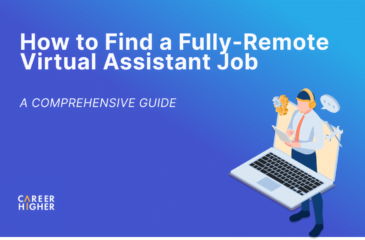Table of Contents
- What skills do you need to become a Remote Accountant?
- Which Tools and Software are required for Remote Accountant Work?
- Is Becoming a Remote Accountant the right career path for you?
- Tips on Finding a Remote Accounting Job
- Establishing Legitimacy of a Job Published Online
- 1) The company demands a fee in exchange for a job
- 2) The organization offers you employment promptly
- 3) The recruiter contacts you out of nowhere
- 4) The salary is absurdly high
- 5) The job brief claims to make you wealthy
- 6) Insufficient or missing company information
- 7) The recruiter demands confidential information
- 8) Vague job description
- Conclusion
Prior to the pandemic, 85% of finance jobs, including accounting, were in offices. That number has since plummeted to just over 31%. This has led to a plethora of opportunities for remote accounting jobs. Whether you are a Certified Public Accountant (CPA) looking to break into the industry or a recent graduate looking for your first job, there are thousands of remote accounting jobs out there just waiting to be filled. If you’ve been wondering how to find remote accounting jobs, you’ve come to the right place. Let’s take a look at some of the best ways to search for these opportunities.
What skills do you need to become a Remote Accountant?
In order to be eligible for remote work, accountants do not require a new set of educational credentials. From bookkeeping to tax accounting, there are various remote accounting roles. Depending on the company, industry, and position, you may need the following qualifications:
- A bachelor’s degree in statistics, economics, accounting, or a closely related field is required.
- A Master’s Degree in Accounting or Business Administration with a major in Finance, in order to apply for higher positions.
- A Certified Public Accountant license
- Experience in a specific industry or domain
- Interpersonal skills like adaptability, problem-solving, empathy, teamwork, and lucidly written and oral communication skills.
Which Tools and Software are required for Remote Accountant Work?
As more people opt for remote work, technology has sped up the development of tools that make it easy, collaborative, and secure to work from home or any other remote workspace. While some organizations may provide all essential tools to their remote accountants, many accountants may still require their own tech stack to operate successfully on a remote project. We recommend using cloud-based software for your tech tools. Some benefits of cloud-based software are –
- Easy data access, so you can work from anywhere with reports, invoices, receipts, and similar data available on the go.
- Enhanced teamwork and collaboration as the data remains in a collaborative state and can be accessed by your peers and clients.
- Better accuracy as cloud computing allows automation of accounting in the form of journal templates, recurring billing, bank reconciliation, payroll, and the like.
- Better security for crucial data as the data is retrievable even in the case of calamities that would normally affect hardware.
- Enhanced speed as cloud security champions automation and does not require time-consuming backup and updates.
Here’s a look at some software tools that can help Remote Accountants to make their work automated, collaborative, and accessible-
- Accounting Tools – Quickbook, Practice Ignition, Wave Accounting, Xero, Bizpayo, Freshbooks, Zoho Books
- Communication and Video Conferencing Tools – Slack, Karbon, Zoom, Google Meet
- Secure File Sharing Tools – Google Drive, Sharefile, Dropbox, SmartVault
- Task Management Tools – Uku, Asana, Karbon
- Schedule Tools – Calendly, Google Calendar, Acuity
- Electronic Signature Tools – Docusign, E-File Magic, Pandadoc, Hellosign
Is Becoming a Remote Accountant the right career path for you?
Are you perplexed and unsure of whether working remotely is the best move for your career? Would it harm your career or provide you with the work-life balance you’ve always desired? To help you get past this conundrum, we have compiled a list of pros and cons.
Pros of Becoming a Remote Accountant
1) Achieve work-life balance
When employees can work remotely, they are afforded the luxury of a few extra hours per week, which they can utilize to partake in activities that improve their quality of life. They may use the extra time to exercise, spend time with their families and friends, further their education by taking online classes, or just relax and unwind. These can help improve their overall well-being.
2) Increased productivity
Many workers worry that their productivity and performance will drop if they adopt a remote position, which could negatively impact their performance reviews and career advancement opportunities. According to a study by Great Place to Work, the majority of respondents were able to maintain or increase their productivity while working remotely. Productivity as a remote worker can be maintained by utilizing a designated work area as one would in an office, keeping it clean and organized, and investing in a reliable wifi connection.
3) Geographic flexibility
Many people choose to reside near their workplace in order to reduce travel time. Unfortunately, this could be a costly affair, with employees living in congested areas, amidst chaos and pollution. A remote job permits you to live in a different section of a town or even relocate to a city where amenities are less expensive with better environment quality.
4) Saving money
Because remote employees can work from anywhere, they can save more money now. An Upwork report states that approx $758 million are being saved per day by post-COVID remote workers on their commute. Remote workers don’t need to live in small, expensive homes close to their places of employment. Suburbs frequently feature more affordable housing and education, allowing remote employees to save money. Think about it, you are not spending as much money on utilities that you had to use every day before going remote – gas, parking, car maintenance, car insurance, expensive office wear, and even more expensive coffee breaks.
Cons of Becoming a Remote Accountant
1) Blurred lines between work hours and personal time
The disadvantage of working remotely is that your work hours may extend much past standard hours. Because there is no rush to get home, people usually don’t mind putting in a few hours of work. Working outside regular business hours, however, becomes a habit for staff members over time and is also an expectation from the management. This trend undermines one of the reasons for encouraging remote work: work-life balance.
2) Working in isolation
When you leave your house to go to work, you automatically put yourself in situations where you will meet coworkers, engage in social interaction, and be surrounded by people at all times. Unfortunately, working remotely can sometimes leave you feeling lonely and disconnected. During the working week, you barely see other people unless it’s on video calls. The loneliness is exacerbated if an employee lives alone and has little to no contact with others during the work week.
3) Distractions at home
While working at home, you may have to deal with multiple interruptions and distractions Doorbells, visitors, pet distractions, and household chores may keep you away from your work. To maintain your productivity, you have to take intentional measures to ensure you don’t get distracted. For instance, fix a corner or a room of the house as your designated workspace, ask your family or roommates to not disturb you during working hours, and schedule your chores.
4) Absent Corporate Culture
A company’s culture is often defined by shared context, shared experiences, and face-to-face communication. The coffee machine in the break room is a minor but significant example of shared infrastructure and experience. Coffee breaks allow employees from different departments to bond and build rapport. However, work from home misses such cultural aspects. As alarming as this loss of corporate culture is, a sense of culture and belongingness can be restored by establishing more touch points, redesigning office culture, and reviewing onboarding procedures. Perhaps, the new office culture could be an agile innovation culture where regular virtual events give a platform to employees to discuss their creative ideas.
5) Reduced Rapport and Communication with Colleagues
Healthy interpersonal relationships are important at work. However, it takes a while to develop a certain camaraderie when colleagues do not meet each other in person. While working in an office, people feel like they belong to a community. This doesn’t happen as quickly during a video call. A lot of people rely on gut feelings and subtle social cues to find their place on the team. However, these cues aren’t always clear over the phone or via video calls. Hence, it could take longer than usual to establish a rapport with a new team member
Tips on Finding a Remote Accounting Job
1) Use reliable remote accounting job sites
There are numerous job sites you can use to search for part-time and full-time remote accounting roles. Some of these positions may require you to live in the same geography, however, not work from an office daily while some may give you to work remotely from anywhere. Below, we have listed some top resources to help you find a remote accounting role.
a) Job boards
Companies often use job boards to list their vacancies and enhance their reach. One of the most popular remote job boards is FlexJobs. It has been around since 2007 and shows jobs with flexible options that have been vetted by their experts. Some other popular job boards listing remote opportunities are Indeed, LinkedIn Jobs, and Monster. Additionally, we have compiled a list of the top job portals that focus on remote employment, including remote accounting positions.
b) Outsourced accounting services
Accounting services can also be outsourced to a virtual firm, just like customer service or logistics operations. There are many virtual businesses that are in need of qualified accountants who can work remotely. Some of these include:
c) Big accounting, audit, and advisory firms
Many large accounting businesses are now considering recruiting remote personnel, which is fantastic news. While most of them want the employee to be located within the United States, a few are open to offering jobs to people beyond the country’s boundaries and freelancers. All you have to do for most of these organizations is type “remote” into the keyword search. Some of these organizations include:
2) Expand and leverage your network
Your network can be a key component in your job search. Although it can be intimidating, networking is essential for growth opportunities and career advancement. We strongly recommend reaching out to people you may have worked or studied with to connect you to your target audiences, such as industry experts and recruiters. Every year, several conferences, seminars, and summits are conducted for the accounting and finance community across all spheres of work. To keep oneself informed of important events taking place nearby, you could use Google, LinkedIn, your alumni network, and the workplace event calendar. Additionally, there are a number of online communities, like accountantforums.com and proformative.com, and forums for accountants where you could meet peers and seniors from your area of work and foster relationships with them.
Establishing Legitimacy of a Job Published Online
Establishing the legitimacy of roles published online can be a potential issue. It can be difficult to know that the business or headhunter you are speaking with is not attempting to unfairly benefit from your resources, money, personal data, and skills. Hence, we have listed some red flags to look out for when trying to find a remote accounting job online.
1) The company demands a fee in exchange for a job
This is one of the most common fraudulent practices witnessed by job seekers. Please keep in mind that no company demands money from candidates to hire them. To make sure that your recruiter is genuine, check their email address and ensure it aligns with the company’s domain. We also suggest having a look at their LinkedIn profile to confirm their identity. It will give you a better idea of who they are, also helping you prepare efficiently for your interview.
2) The organization offers you employment promptly
If a company offers you a job without interviewing you or testing your skills, it is a clear signal to abort your communication with them. Every genuine role and company will have several rounds of interviews with the hiring manager, senior management, and HR. Many companies also administer aptitude tests to determine the applicant’s skill set. Thus, be wary and investigate when an offer is made without putting your skills to test.
3) The recruiter contacts you out of nowhere
If you haven’t sent out any job applications or applied to a specific job opening, but a recruiter still calls you, proceed with caution. These are often scams that target job seekers looking to get hired quickly and without a lot of effort. They often ask for a large amount of personal information and encourage you to send money in order to get the job you want.
4) The salary is absurdly high
It’s likely a phony job if the salary looks out of line with the job’s requirements for experience, seniority, and hours worked. For instance, an entry-level accountant’s salary listed at $100,000 seems absurdly high for the experience. Fraud recruiters might inflate salaries to get the attention of job seekers.
5) The job brief claims to make you wealthy
If the job description promises to make the applicant wealthy quickly, that should raise a red flag. These gimmicky claims are made by fraudulent or unlawful companies. Credible businesses don’t promise to make their employees rich, but they do talk about competitive compensation and fantastic perks.
6) Insufficient or missing company information
Any time you are contacted by a company you are unfamiliar with, it is imperative to do a quick Google search. It might be a bogus firm if it doesn’t have a website and its Google business profile doesn’t list any phone numbers or addresses. A legitimate company would normally have some presence on the internet with contact information.
7) The recruiter demands confidential information
If a company requests private information, such as your bank account information, social security number, or the customer list of your present employer, without having made an offer, it can just be a fraudulent operation out to defraud you. Scammers can extract critical information from unsuspecting job seekers to illegally operate their bank accounts or credit cards.
8) Vague job description
A job description that provides little information and requests basic qualifications such as candidates being of legal age, having a laptop, and knowing how to type may not be employing people of your caliber. A company looking for remote accountants will highlight the educational requirements, such as a bachelor’s degree in accounting, as well as the required experience and skills, such as Quickbooks.
Conclusion
As more companies transition to new models of work, it is a good time for accountants to explore remote work too. Professional accountants can search for remote opportunities by using job boards, applying to virtual accounting firms, and monitoring prominent accounting firms that have remote positions. We also advise remote accountants to invest in, or at the very least learn the technology stack essential for remote work. If you’ve decided to go remote, make sure you prepare adequately so you can ace even the toughest job interviews and land your dream remote job.











